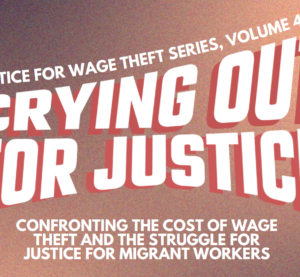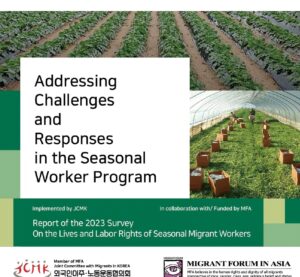International Campaign For The Recognition Of Domestic Work As Work
— August 5, 2010The fair and equal treatment of domestic workers has been among the major concerns of Migrant Forum in Asia (MFA) in its advocacy for the protection and promotion of the rights of migrant workers and their families in Asia especially women migrant domestic workers.
Our Campaign
MFA’s commitment to the issue of domestic work dates back to the network’s establishment in 1994, in a forum held in Taiwan, Province of China entitled, “Living and Working Together with Migrants in Asia”. Since then, the issue of domestic work has been a core concern of its programs.
The International Campaign for the Recognition of Domestic Work as Work is the network’s response to the growing abuses and violations committed against migrant domestic workers. In general, the campaign seeks to advocate for concrete policies and practices in Asia and internationally that would recognize, institutionalize and advance the rights and status of MDWs as workers. Specifically, it seeks to:
- Advocate for the recognition of rights and status of DWs in Asia and across regions
- Intervene in ILO DW Convention process
- Lobby for the establishment of local/national laws recognizing the rights and status of DWs
- Promote of policies that ensure the respect of DWs’ rights as people, as women (95% of DWs are women), and as workers
- Campaign for the removal of discriminatory policies against migrant domestic workers
- Creating public awareness in recognizing, respecting, and promoting the rights and status of DWs
On 18 December 2006, in celebration of the International Migrants’ Day, MFA launched the “Equal Pay for Equal Work Campaign” as response to the growing discrimination in terms of wages of migrant domestic workers coming from different nationalities. The campaign aims to promote equal, fair and human treatment, just living and working conditions, access to opportunity for advancement and well-being and equal pay for equal work among local and migrant domestic workers.
In June 2007, MFA played an instrumental role in the creation of the Asian Migrant Domestic Workers’ Alliance (ADWA) as a resolution of the 1st Asian Domestic Workers Assembly held in Manila. ADWA is a self-representative regional alliance of migrant domestic workers. The alliance is led by the grassroots MDW organizations while the NGOs/civil society partners provide support and facilitation to enable MDWs in Asia to self-represent and advocate for their common interests and objectives. The Asian Migrant Centre (AMC) and Migrant Forum in Asia (MFA) are the Asian regional advisers of ADWA.
In May 2008, MFA together with ADWA, Coalition for Migrants Rights (CMR), Serikat Buruh Migrant Indonesia (SBMI), Humanitarian Organization on Migration Economics (HOME) Asian Migrant Centre (AMC) and International Labor Office- Jakarta (ILO) launched the “Regional Campaign for the Recognition & Protection of Migrant Domestic Workers” coinciding with the International Labor Day to emphasize the workers’ agenda of the DW campaign.
In October 2008, the 3rd International Workshop of DWs was convened in Manila in time for the 2nd GFMD. It was convened by ADWA, RESPECT MDW Campaign Network in Europe, and MFA. Co-organizing the event was AMC, HRW, Asian Domestic Workers Network (ADWN), International Union of Food, Agriculture, Hotel, Restaurant, Catering, Tobacco & Allied Workers Associations (IUF), and supported by MRI. More than 85 representatives from 15 countries in Asia, Europe, North America, Latin America, Middle East and Africa joined. The workshop was a follow-up to similar DW meetings held in 2006 (New York) and 2007 (Brussels) as part of the civil society workshops during the GFMD. The International Working Group for Domestic Workers (IWG-DW) was established to coordinate and spearhead the international DW campaign. MFA, ADWA and RESPECT were appointed as the IWG Steering Committee.
MFA believes that the special conditions of domestic workers require legislative frameworks that address their needs if their rights are to be protected. The framework must be drafted with focus on dignity of work and rights to life and safety, which are necessary to improve the conditions of domestic workers. An international instrument on the rights of domestic workers will go a long way in setting standards that can be translated into national legal frameworks.
In 2009, MFA together with ADWA spearheaded consultations at the national and regional levels to prepare for the upcoming International Labour Conference in 2010 and 2011. Using the ILO-released questionnaire, the consultations generated responses to a possible ILO instrument that will address the specific conditions of domestic workers and strengthen protections of this vulnerable informal sector. These consultations were done in collaboration with our partner trade unions and civil society organizations.
These processes also validated the ILO report that while there are existing legislations/mechanisms that protect DWs, these are not enough to address specific conditions of DWs, and justifies the need for a Convention. Domestic workers face problems under the four pillars of decent work, which include: rights to work, employment, social protection and social dialogue. It was agreed that discourses on domestic work and migrant domestic work are same. The need to promote the alliance of domestic workers and migrant domestic workers was also emphasized.
The regional consultation came up with three slogans on domestic work which the network and its partners will carry in their respective campaigns at the local level.
These are the following:
- Domestic Work is Work!
- Domestic Workers are Workers!
- Domestic Work is Not Slavery!
In June 2010, MFA had a 25-person delegation to the International Labor Conference’s 99th Session which had among its agenda items, Decent Work for Domestic Workers. With some members of the delegation acting as advisors to their respective countries’ Working Groups and the rest actively participating in the Workers’ Group meetings, MFA witnessed how the Conference voted to have a Convention supplemented by a Recommendation, a big first step in realizing a Convention for Domestic Workers. MFA also held side events at the Human Rights Council’s 14th Session which coincided with the ILC, as well as public events (poster gallery, concert, etc.) to highlight the issue. Given this significant development at the ILO, the campaign for the Adoption of an ILO Convention in 2011 will be a primary focus in the network’s umbrella campaign for the Recognition of Domestic Work as Work.



